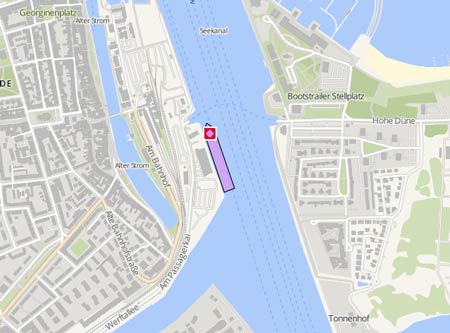TAN CANG VICTORYverschrottet
Kurs/Position
vor 1971 Tagen
Die letzten Häfen
Die letzten Wegpunkte
Die neuesten Nachrichten
Beached
Beached at Alang 23.11.19
arrived Alang Anchorage
arrived Alang Anchorage 18.11.19
MS “Jule” Schiffahrtsgesellschaft GmbH & Co. KG, convicted and fined $30,000 for leaking heavy fuel oil
The German owners of the "Liloa", the MS “Jule” Schiffahrtsgesellschaft GmbH & Co. KG, has been convicted and fined $30,000 for leaking an estimated 1000 litres of heavy fuel oil into the harbour from the ship at the Port of Tauranga in July 2013. The owners pleaded guilty to a charge of discharging a harmful substance into water in the coastal marine area. The "Liloa" transports cargo around the South Pacific with a crew of 15 from Russia, the Ukraine, Poland and the Philippines, refuelling in Tauranga every three to four weeks since March 2013. The incident happened on its seventh refuelling on returning from Tonga when 163,000 litres of heavy fuel oil was being transferred onto the vessel. One of the three tanks did not have enough capacity and at 4.20 p.m. the crew saw the tank was overflowing with oil spilling from the deck into the sea. They requested an emergency stop to the bunkering. The deck was ankle-deep with oil, overflowing from the deck to the sea in two places on the vessel’s far side from the wharf. It also spread to the port side of the deck but was not over-flowing on that side due to the vessel’s starboard list. The Chief Engineer said the vessel’s bunkering documentation was wrong as he had been too busy. The vessel’s fuel tanks should have flowed to an overflow tank, but this had not happened, and the vessel’s fuel tanks had no pipes connecting them to the overflow tank. When the second engineer realized the No.2 starboard tank was overflowing, he began transferring HFO from the No.2 starboard tank into other tanks. Bay of Plenty Regional Council’s Harbourmaster was notified and saw an oil slick 100 metres wide and 600 metres long stretching towards Mount Maunganui and extending between the boats on swing moorings at Pilot Bay. Regional Council officers found the vessel’s crew cleaning up the oil on the deck using saw dust, sorbent pads and rags. The Regional Council arranged removal and disposal of several 200 litre drums of oily waste, rags and clean-up materials from the vessel and for a sucker truck to remove the liquid waste that had been collected and the operation was completed in the early hours of the following morning. A light oil residue was found on the beach and sea grass at the high water mark along the beach at Pilot Bay the following day, which was cleaned up by Council staff. A local sea kayaker also reported that his sea kayak was coated with oil from the spill. Maritime New Zealand issued a notice to the vessel’s master identifying deficiencies in the vessel’s fuel bunkering procedures. The company conducted its own internal investigation into the cause of the spill and had tightened its bunkering procedures. It said the oil over-flowed because of confusion between the Chief Engineer and Second Engineer about which tanks were to be filled, and because the Second Engineer relied on an alarm that was not turned on at the time of the fuel transfer. The Regional Council’s investigations revealed a number of errors in the vessels bunkering procedures and poor record keeping.
News schreiben

